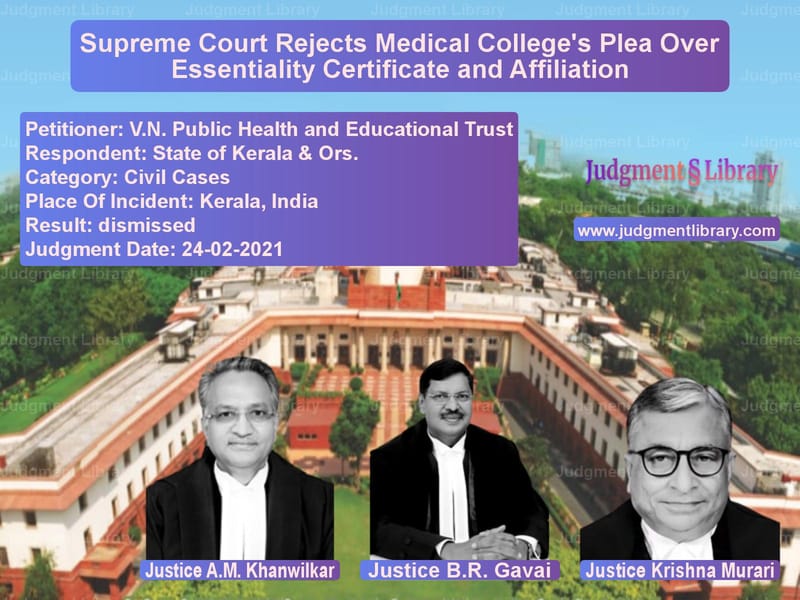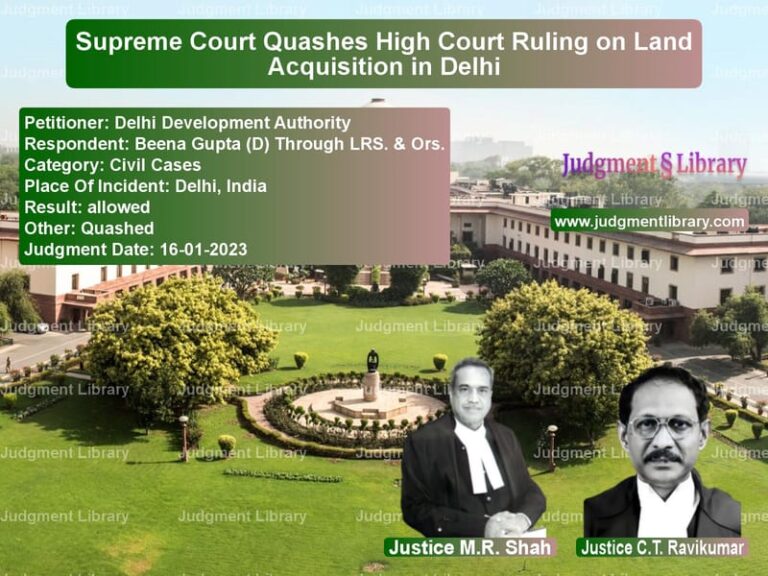Supreme Court Rejects Medical College’s Plea Over Essentiality Certificate and Affiliation
The Supreme Court of India has ruled against the plea of V.N. Public Health and Educational Trust in the case of V.N. Public Health and Educational Trust vs. State of Kerala & Ors., refusing its request for an Essentiality Certificate (EC) and Consent of Affiliation (CoA) for establishing a medical college for the academic year 2020-21. The judgment, delivered on February 24, 2021, highlights the importance of compliance with Medical Council of India (MCI) regulations and adherence to prescribed deadlines.
The case revolved around the trust’s repeated attempts to establish a medical college in Palakkad, Kerala, since 2006. Despite multiple applications, the trust failed to obtain timely approval due to deficiencies in its hospital infrastructure, lack of faculty, and other regulatory non-compliances. The Supreme Court upheld the Kerala High Court’s decision to deny the request for the academic year 2020-21 while allowing the trust to reapply for the following academic session.
Background of the Case
Trust’s Efforts to Establish a Medical College
The appellant, V.N. Public Health and Educational Trust, claimed that it had set up a 300-bedded hospital in Walayar, Palakkad District, in 2006 to establish a medical college. It repeatedly sought approval from the Kerala government and Kerala University of Health Sciences (KUHS) but was denied the necessary clearances due to deficiencies.
The trust had received an EC on January 24, 2004, but the MCI refused to accept it due to formatting errors. Subsequent applications in 2009, 2011, and 2014 also faced rejection due to non-compliance with deadlines and procedural requirements. The trust’s application for the academic year 2020-21 was again rejected by the Kerala government and KUHS, leading to the present legal challenge.
Legal Challenge
The trust argued that:
- Granting an Essentiality Certificate (EC) is a ministerial function of the state government and should not be denied.
- The EC issued in previous years should be considered valid for 2020-21.
- The denial of the EC and CoA was arbitrary and discriminatory.
The Kerala government, however, contended that:
- The trust failed to meet infrastructure and faculty requirements set by the MCI.
- The state government is responsible for verifying compliance before issuing an EC.
- The MCI had already rejected the trust’s previous applications due to non-compliance.
Supreme Court’s Observations and Ruling
Issuance of Essentiality Certificate is Not a Ministerial Act
The Supreme Court rejected the argument that granting an EC is merely a ministerial act, stating:
“An Essentiality Certificate legitimizes a medical college and ensures compliance with necessary standards. The state government has a duty to verify compliance before issuing or renewing the certificate.”
The Court emphasized that an EC is not automatically valid indefinitely and must be subject to continuous compliance.
Failure to Meet Regulatory Requirements
The Court noted significant deficiencies in the trust’s medical college proposal, including:
- Faculty shortages of 32% and tutor/demonstrator shortages of 78%.
- Inadequate ICU beds—18 available instead of the required 60.
- Low hospital bed occupancy—only 30% at the time of inspection.
- Lack of an operational blood bank.
- Incomplete hospital infrastructure and missing laboratory facilities.
Time Schedule for Medical College Approvals
The Supreme Court stressed the importance of adhering to the MCI’s time schedule for new medical colleges. It ruled:
“Once the deadline for a particular academic year has passed, the application cannot be considered. The trust is free to apply for the next academic session, provided it meets all necessary requirements.”
Final Judgment
- The Supreme Court dismissed the appeal and upheld the Kerala High Court’s decision.
- The Court allowed the trust to apply for the academic year 2021-22 if it rectified the deficiencies.
- The ruling reinforced that compliance with regulatory requirements is non-negotiable.
Key Takeaways from the Judgment
- State governments have a duty to verify compliance before granting an EC.
- Medical colleges must meet infrastructure and faculty requirements to obtain approval.
- ECs are not permanent and can be revoked if requirements are not met.
- Strict adherence to deadlines is necessary for medical college approvals.
- Judicial intervention cannot override regulatory compliance requirements.
Impact of the Judgment
This ruling reinforces the importance of maintaining high standards in medical education. It prevents underprepared institutions from admitting students and ensures that medical colleges meet MCI regulations.
The decision also clarifies that state governments and universities have an active role in enforcing educational standards and that judicial intervention will not permit non-compliant institutions to bypass regulatory oversight.
Conclusion
The Supreme Court’s judgment in V.N. Public Health and Educational Trust vs. State of Kerala & Ors. sets a precedent in medical education regulation. It upholds the principle that establishing a medical college requires adherence to MCI regulations and that the process cannot be circumvented through judicial appeals.
Institutions seeking to establish medical colleges must ensure full compliance with faculty, infrastructure, and hospital requirements before applying for permissions. This judgment serves as a reminder that quality education and public health must be prioritized over institutional ambitions.
Petitioner Name: V.N. Public Health and Educational Trust.Respondent Name: State of Kerala & Ors..Judgment By: Justice A.M. Khanwilkar, Justice B.R. Gavai, Justice Krishna Murari.Place Of Incident: Kerala, India.Judgment Date: 24-02-2021.
Don’t miss out on the full details! Download the complete judgment in PDF format below and gain valuable insights instantly!
Download Judgment: v.n.-public-health-a-vs-state-of-kerala-&-or-supreme-court-of-india-judgment-dated-24-02-2021.pdf
Directly Download Judgment: Directly download this Judgment
See all petitions in Education Related Cases
See all petitions in Judgment by A M Khanwilkar
See all petitions in Judgment by B R Gavai
See all petitions in Judgment by Krishna Murari
See all petitions in dismissed
See all petitions in supreme court of India judgments February 2021
See all petitions in 2021 judgments
See all posts in Civil Cases Category
See all allowed petitions in Civil Cases Category
See all Dismissed petitions in Civil Cases Category
See all partially allowed petitions in Civil Cases Category







